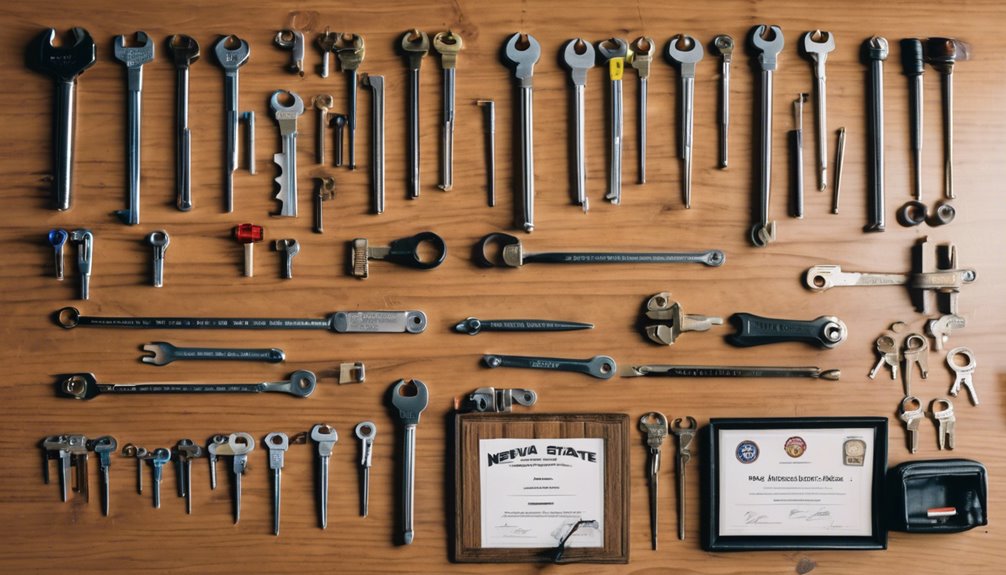Becoming a locksmith in Nevada is like picking the perfect lock; it requires skill, patience, and the right tools. With the demand for locksmiths on the rise, understanding the essential training and licensing process can set you on the right path. But what are the specific steps you need to take to access this career opportunity? Let’s explore how you can secure your future in the locksmithing field.
Key Takeaways
- Complete a locksmith training program covering essential skills like lock picking and key cutting.
- Obtain locksmith certification from the Associated Locksmiths of America (ALOA) to enhance your credentials.
- Apply for a locksmith license through your local county sheriff’s office, following specific county requirements.
- Gain hands-on experience through apprenticeships with experienced locksmiths for practical skill development.
- Develop strong customer service skills to effectively communicate and build trust with clients.
Understanding the Role of a Locksmith in Nevada

Understanding the role of a locksmith in Nevada is important if you’re considering this career path. As a locksmith in Nevada, you’ll make, repair, and adjust locks while providing essential security solutions for residential and commercial clients.
Your responsibilities include lock installation, maintenance, and emergency lockout assistance. To operate legally, you’ll need locksmith licensing, which varies by county—especially in places like Clark County and Washoe County.
Completing locksmith training is critical to develop the skills necessary for this profession. Options include online courses and hands-on workshops, with certifications from the Associated Locksmiths of America (ALOA) showcasing your expertise.
Essential Training and Education for Aspiring Locksmiths
To kickstart your career as a locksmith in Nevada, you’ll need to engage in effective training and education. Consider enrolling in training programs that cover essential skills like lock picking, key cutting, and security systems.
While state-mandated training isn’t required, pursuing locksmith certification from the Associated Locksmiths of America (ALOA) can enhance your credentials. Certifications like Certified Registered Locksmith (CRL) and Certified Master Locksmith (CML) showcase your expertise.
Additionally, gaining locksmithing experience through apprenticeships under seasoned locksmiths offers invaluable hands-on practice. Extensive courses often explore specialized topics, ensuring you’re well-equipped to tackle various security challenges.
With the right training, you’ll be on your way to a successful locksmith career in Nevada.

As you commence your journey to become a locksmith in Nevada, steering through the licensing process is essential. You’ll need to submit your locksmith license application to your local county sheriff’s office, as requirements differ by county.
Here’s a quick comparison:
| County | Licensing Requirements |
|---|---|
| Clark County | 300 sqft location, personal & financial investigations |
| Washoe County | Background check, fingerprints submitted |
| Fees | Varies by county; Washoe’s new business fee: $77.75 |
| Renewal | Annual renewals required to avoid penalties |
Key Considerations for a Successful Locksmith Career
Once you’ve navigated the licensing process, several key factors can enhance your success as a locksmith in Nevada. Here are some essential considerations:
- Obtain hands-on training through formal education or apprenticeships.
- Pursue Continuing Education to stay current with industry advancements.
- Develop strong customer service skills to effectively communicate security solutions.
- Seek certification from recognized organizations like the Associated Locksmiths of America (ALOA).
Being a licensed locksmith isn’t just about passing the exam; it’s about mastering practical skills, understanding complex lock mechanisms, and building trust with your clients.
Ongoing education and training are crucial for career growth and ensuring you maintain a competitive edge in this evolving field. Embrace these factors, and you’ll set yourself up for a successful locksmith career.
Salary Insights and Job Outlook for Locksmiths in Nevada

Locksmithing in Nevada offers promising salary insights and a positive job outlook, making it an attractive career choice.
In the Las Vegas-Henderson-Paradise area, the average annual salary for locksmiths is about $58,330, which breaks down to around $28.04 per hour. Your income can vary based on experience, the type of services offered, and your specific location within the state.
The job outlook is bright, as demand for skilled locksmiths continues to rise due to growing security concerns among homeowners and businesses.
Frequently Asked Questions
Do You Need a License to Be a Locksmith in Nevada?
Ever thought about the consequences of working without a license? In Nevada, you absolutely need one to operate as a locksmith.
Licensing requirements vary by county, so you’ll need to check with your local sheriff’s office. For instance, Clark County expects a physical location, while Washoe County requires a business license and a background check.
Keep in mind, annual renewals are mandatory, and operating without a license can lead to hefty fines or even criminal charges.
Do Locksmiths Make Good Money?
Yes, locksmiths can make good money.
In areas like Las Vegas, the average salary is around $58,330 a year, which breaks down to about $28.04 an hour.
Your earnings can vary based on your experience and specialization.
If you focus on high-demand areas like automotive security or advanced lock systems, you could earn even more.
Staying updated with certifications can also boost your income and enhance your professional reputation.
How Long Does It Take to Learn to Be a Locksmith?
When it comes to learning locksmithing, it’s not a one-size-fits-all deal.
You’ll typically spend about 4 to 6 weeks on basic training, but if you’re aiming for advanced skills, be prepared for several months.
Getting hands-on experience through an apprenticeship can take 1 to 3 years.
If you choose online courses, you might wrap it up in a few weeks, but certification will add extra time to your journey.
Do You Need a Permit to Be a Locksmith?
Yes, you need a permit to be a locksmith.
This permit is typically issued by the local sheriff’s office after you submit your application and pass a background check.
Each county has its own requirements, so you’ll want to check the specific rules where you plan to operate.
In some cases, you might get a temporary permit while waiting for the full license, but keep in mind it can be revoked if issues arise.








